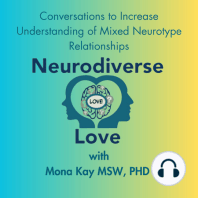62 min listen

Alina Kislenko-Changing Therapeutic Models & Creating Paradigm Shifts in Neurodiverse Couples Counseling
Alina Kislenko-Changing Therapeutic Models & Creating Paradigm Shifts in Neurodiverse Couples Counseling
ratings:
Length:
63 minutes
Released:
Dec 25, 2021
Format:
Podcast episode
Description
Psychotherapist and Professor Alina Kislenko is redesigning therapeutic models for neurodivergent individuals and neurodiverse couples. She is committed to training other therapists so that ableism and oppressive views of neurodiversity became a thing of the past. Alina shared how her "PI" model of "Parts Inclusion" can create new words and ways of communicating emotions in neurodiverse relationships. In addition, her and her neurodivergent husband (who is also a therapist) are both ADHD and autistic and they work together regularly to reassess their strengths and challenges. Alina talks about the importance of having regular "State of the Union" meetings (a concept developed by Dr. John Gottman) with your partner to prevent divisive fights that can create ongoing challenges. She also talks about how her husband and her talk about "planning their divorce" so that they are aware of what norms and traits they may need to address as individuals and as a couple to ensure that they continue to thrive individually and in their relationship.
Alina also offers very important advice on the determining factor to whether a neurodiverse relationship can thrive...specifically, whether "both partners are willing to do the work the other needs within the timeframe the other partner needs it done". Each partner has an opportunity to determine which of their partners traits are not going away or changing and if they can (and will) accept that trait.
Alina also talks about how many neurodiverse relationships that include two neurodivergent partners may be very similar to LGBTQ+ relationships, because both partners may be more flexible and understanding of the norms that are critical to each partner.
This is another "don't miss" episode where we talk about things we have never talked about on this podcast. Alina offered so many nuggets of gold and we will be having her back on the podcast with her husband in early 2022.
If you would like to reach Alina or the other therapists at the Centre, you can check out their website at: www.ADHDInterrupted.com. You can also join Alina's Facebook group at ADHD Interrupted.
________________________________________________________________________________________________________________________________
If you are interested in learning more about neurodiverse relationships, please check out the resources available on our website at: www.neurodiverselove.com
If you would like to join one of the Neurodiverse Love Peer Support Groups you can send us a DM on Instagram @neurodiverse_love, or send us an e-mail at neurodiverselove4u@gmail.com
Thank you for being a part of the Neurodiverse Love community. Please subscribe or follow our podcast and share this episode (or others) with friends or family that might be interested in this issue.
---
Send in a voice message: https://anchor.fm/neurodiverse-love/message
Alina also offers very important advice on the determining factor to whether a neurodiverse relationship can thrive...specifically, whether "both partners are willing to do the work the other needs within the timeframe the other partner needs it done". Each partner has an opportunity to determine which of their partners traits are not going away or changing and if they can (and will) accept that trait.
Alina also talks about how many neurodiverse relationships that include two neurodivergent partners may be very similar to LGBTQ+ relationships, because both partners may be more flexible and understanding of the norms that are critical to each partner.
This is another "don't miss" episode where we talk about things we have never talked about on this podcast. Alina offered so many nuggets of gold and we will be having her back on the podcast with her husband in early 2022.
If you would like to reach Alina or the other therapists at the Centre, you can check out their website at: www.ADHDInterrupted.com. You can also join Alina's Facebook group at ADHD Interrupted.
________________________________________________________________________________________________________________________________
If you are interested in learning more about neurodiverse relationships, please check out the resources available on our website at: www.neurodiverselove.com
If you would like to join one of the Neurodiverse Love Peer Support Groups you can send us a DM on Instagram @neurodiverse_love, or send us an e-mail at neurodiverselove4u@gmail.com
Thank you for being a part of the Neurodiverse Love community. Please subscribe or follow our podcast and share this episode (or others) with friends or family that might be interested in this issue.
---
Send in a voice message: https://anchor.fm/neurodiverse-love/message
Released:
Dec 25, 2021
Format:
Podcast episode
Titles in the series (100)
What to Say Next--Successful Communication in Work, Life, and Love with Autism Spectrum Disorder-Meet the Authors of this Book-- Sarah & Larry Nannery who are a Very Inspirational Neurodiverse Couple by Neurodiverse Love with Mona Kay